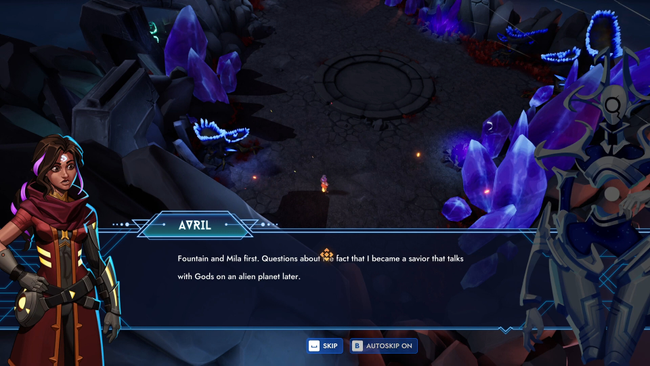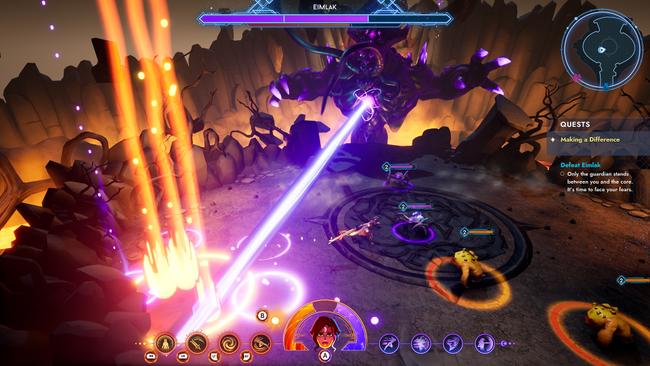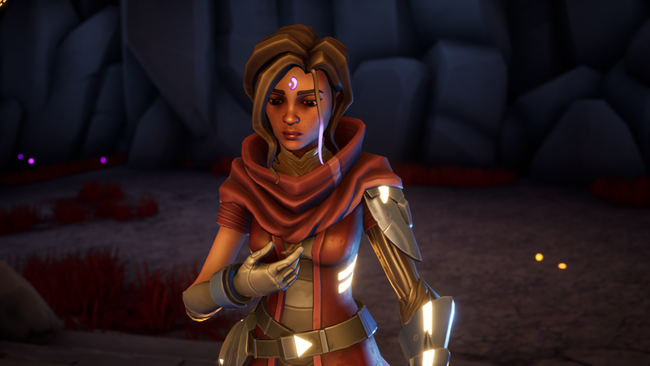
Batora: Lost Haven Review
When I first saw footage of Batora: Lost Haven at the beginning of 2021, I don't know if I was completely sold on the game yet, but I was at least curious to see more. I wasn't very familiar with Stormind Games' previous works - the Remothered series of survival horror games - but the colorful aesthetic and fluid isometric action RPG combat in Batora seemed promising enough to entice me to check out the full game, now that it has been released for nearly every platform. I went in hoping for the best - genuinely - but I come away from Batora wholly disappointed by the experience.
In the world of Batora, large sections of the Earth have been annihilated by some unknown force, resulting in innumerable casualties. The game opens up with the player character Avril and her best friend Mila navigating the ruined streets of London, before enigmatic God-like beings bequeath supernatural abilities to Avril, and they give her a promise on how to save the world. Essentially, by visiting four other elemental planets and absorbing their cores, supposedly, Avril can restore the universe - at least to some extent.
This is the basic premise of Batora: Lost Haven, which - on paper - is fine. Even a predictable standard-fare narrative can be enjoyable if the character cast is relatable, interesting, or charismatic enough. But Batora's narrative efforts, regardless of quality, are blanketed & obfuscated by a wad of tedious dialogue.

Even before I got past the opening scenes to the game's first gameplay segment, I found myself slightly irritated by Batora's writing, which is annoyingly "quippy". That's probably not the most elegant way to describe it, but hopefully, that alone gives you some idea of what to expect. Chock full of zingers, one-liners, frequent sarcasm, and numerous irreverent remarks about the current situation - Batora's stifling dialogue annoyed me early & often. I'm certainly not against some wit & humor; levity is a valuable thing to have in opportune situations, but you'll find weary banter all over the place in Batora.
Even so, I didn't really come to Batora for the story or writing to begin with. Early on, I could tell that the narrative elements were simply not going to be the component to grab me. A bummer, for sure, but maybe compelling gameplay would be what I could latch onto, instead.
The main gimmick to Batora's isometric action-based combat is that it is separated into two modes, or what the game calls Natures. In Avril's Physical Nature form, she wields a broadsword, attacking enemies up-close-and-personal with melee attacks. In her Spiritual Nature form, Avril wields purple magic, shooting enemies at a distance with what are effectively magic bullets.

You can switch between these two attack forms at any time, and various enemies in the game will be weak to one of the other - generously indicated by a color-coded reticle around the unit. So, in order to be successful in Batora, you basically need to learn how to play each form and to switch to the form that takes advantage of your foe's weakness.
This is - once again - fine. It's dynamic enough that the player needs to know when to swing Avril's sword and when to shoot magic bullets. But even for Batora's short runtime, which is about 6-7 hours, this gimmick wore out its welcome relatively quickly. There's nothing inherently broken or poorly designed about it, it's simply just not very interesting over the course of the game.
Outside of its basic combat premise, Batora is also inordinately thin for an RPG. There is no skill tree or any other sort of manner for the player to customize the action gameplay stylings. There is no equipment or weapons to adjust your character build, other than Runes that just modestly bump stats. There are no sidequests or generally any reason to explore. The game environments are essentially straight lines. This is admittedly a bit reductive, but you effectively move along the single game path, taking on encounters trapped on the way, until you reach the ending.
There are also various puzzles that you'll have to solve along the way, which involve using your Physical and Spiritual natures to press buttons in a certain order, but these also come across as repetitive and simple more than anything actually engaging.

This all leads Batora to simply feel boring to play. A part of this is on me, certainly. I've always been more of a mechanics type of RPG player. I relish diving deep into gameplay systems and components, coordinating party set-ups, skill load-outs, gear allocation, resource management, and the like. Simply put, Batora just doesn't have any of that. There are level-ups for Avril, as you may expect, but they are about as plain as they come. If you are seeking a streamlined isometric action RPG experience, you may find a lot to like in Batora. For me though, the lack of substance left me feeling disengaged.
Batora also boasts "choice and consequence" throughout its narrative, but this too lands a bit lean. At certain points during the story, you'll be given a choice between two philosophies, known as Defender and Conqueror. This works similar to the Paragon/Renegade selections of the Mass Effect series, down to the dialogue choices being color-coded indicating which option is for which route.
I've never been much of a fan of this kind of choice design. By color-coding the selection, you are effectively already labeling certain choices with a certain philosophy, as defined by the game. By doing this, for players sticking to one of these - Defender or Conquerer - the decision is essentially already made for them without any consideration given. I won't get into the minute details here, but given the way that Karma Points and Rune requirements work in the first place, there is also little reason to mix up philosophies. These choices also really don't amount to much in the end.
I come away from Batora: Lost Haven greatly disappointed. With tedious dialogue, a mediocre narrative, and thin gameplay structure, Batora is only salvaged by its adequate combat, respectable art, and a mercifully short runtime.